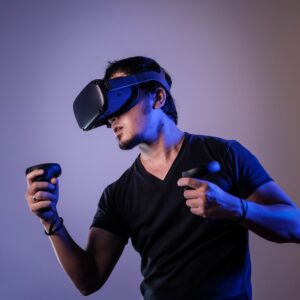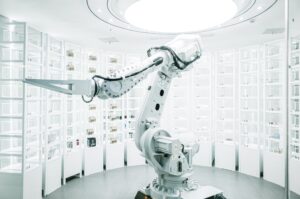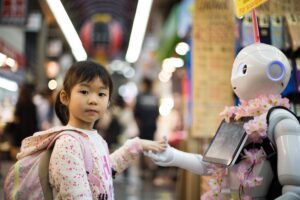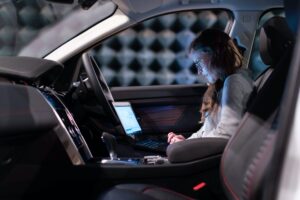
Welcome to the future, where robots aren’t just sci-fi characters, and artificial intelligence (AI) isn’t just a concept. AI is now becoming an integral part of our daily lives, from the smart assistants we talk to in the morning to the personalized recommendations we receive on our phones. In this section, we’ll explore the fascinating world of AI in daily life, and how it has completely transformed the way we interact with technology. So buckle up and get ready for an intelligent ride!
Exploring the Benefits of AI in Daily Life
Let’s face it, we live in an age where technology is constantly advancing. From smartphones to smart homes, we rely on technology to simplify our daily routines. Artificial intelligence (AI) is one such technology that has become increasingly mainstream, making our lives easier and more convenient than ever before.
Why AI Matters
The beauty of AI lies in its ability to learn and improve over time. Machine learning algorithms enable AI systems to recognize patterns and make predictions, enabling them to perform complex tasks faster and more efficiently than humans. This opens up a world of possibilities for the integration of AI in daily life.
Applications of AI in Daily Life
- Smart assistants: Siri, Alexa, and Google Assistant have become ubiquitous household names, helping us manage our schedules, answer questions, and control our smart devices.
- Personalized recommendations: From Netflix and Spotify to Amazon and YouTube, AI-powered recommendation engines analyze our preferences and habits to suggest content tailor-made to our interests.
- Health and wellness: Wearable devices with AI technology can help track our physical activity, monitor our sleep patterns, and even provide personalized feedback on our health and wellness.
Revolutionizing Different Sectors
AI technology is not limited to consumer products; it has significant applications in other sectors as well.
In healthcare, AI algorithms aid in diagnosing diseases and analyzing medical data, improving patient outcomes and revolutionizing the industry. In transportation, autonomous vehicles and predictive maintenance systems are making the movement of people and goods safer and more efficient. In education, AI-powered tutoring systems are helping students learn at their own pace and providing personalized feedback.
As you can see, the applications of AI are widespread, and the technology is only set to grow and improve with time. So, embrace the power of AI and enjoy the many benefits it has to offer in your daily life!
AI in Consumer Products: Enhancing Convenience and Efficiency
Imagine waking up to a house that is already set to your preferred temperature, your coffee brewed to perfection, and your favorite playlist playing on the speaker. All thanks to the power of AI integrated into consumer products.
From smart speakers to personal assistants, AI-powered devices are revolutionizing the way we interact with technology in our daily lives. Take the Amazon Echo, for example, which uses natural language processing and machine learning algorithms to understand users’ commands and help them with tasks like setting reminders and playing music.
But the impact of AI in consumer products goes beyond just home automation. Retailers are using AI to personalize the shopping experience for customers, recommending products based on their previous purchases and online behavior. AI-powered chatbots are also becoming increasingly popular, helping companies provide 24/7 customer support and improving response times.
AI is turning our homes and shopping experiences into futuristic wonderlands, where we can sit back and let technology do the work for us.
And the convenience doesn’t stop there. AI is now being integrated into everyday products like toothbrushes and refrigerators, making them smarter and more efficient. For example, the Oral-B Genius X toothbrush uses AI technology to track users’ brushing habits and provide personalized recommendations for better oral health.
- Who needs a dentist when you have AI-powered toothbrushes?
- Not me! My toothbrush knows me better than my dentist.
And it’s not just personal care products. AI is being used in appliances like refrigerators to optimize energy usage and reduce waste. LG’s Smart ThinQ refrigerator, for example, uses AI to analyze users’ food consumption and provide recommendations for healthier eating habits.
AI in Consumer Products: Making Life Easier and More Efficient
The integration of AI into consumer products is not just about adding cool features. It’s about making our lives easier and more efficient. With AI-powered devices and services, we can automate routine tasks, personalize our experiences, and save time and energy. And as technology continues to advance, we can only expect to see more exciting applications of AI in our daily lives.
AI in Healthcare: Revolutionizing Patient Care and Diagnosis
When we think of AI, we may not immediately associate it with the healthcare industry. But in reality, AI has been revolutionizing patient care and diagnosis in ways we never thought possible.
One of the most significant benefits of AI in healthcare is its ability to analyze vast amounts of medical data. With AI algorithms, medical professionals can make more accurate diagnoses, predict patient outcomes, and streamline treatments.
Virtual doctors are also becoming more prevalent with the help of AI technology. These digital doctors can perform routine check-ups, answer patient questions, and even prescribe medications.
But perhaps the most impressive application of AI in healthcare is its ability to detect diseases at an early stage. With AI-powered imaging technology, doctors can detect cancer and other diseases before symptoms even appear, giving patients a higher chance of successful treatment.
Challenges and Concerns of AI in Daily Life
- One concern with the integration of AI in healthcare is the potential for errors in the algorithms. It’s crucial to ensure that these algorithms are thoroughly tested and validated before implementing them in patient care.
- Another challenge is the need for medical professionals to learn how to use AI technology effectively. As AI becomes more integrated into healthcare, it’s essential for healthcare professionals to receive training on how to use these tools.
- Lastly, there is the issue of patient privacy. As more medical data is collected and analyzed through AI, it’s crucial to safeguard patient information and ensure that it’s only used for medical purposes.
Despite these challenges, the potential benefits of AI in healthcare are enormous. With AI technology, we can improve patient outcomes, detect diseases at an early stage, and provide more personalized care. It’s an exciting time for healthcare, and AI is at the forefront of this revolution.
AI in Transportation: Redefining the Way We Move
Who needs a driver’s license when you have an AI-powered car? That’s right, folks – the transportation industry is getting a major upgrade thanks to artificial intelligence. And it’s not just about self-driving cars; AI is changing the way we move in so many ways.
One of the biggest benefits of AI in transportation is safety. Self-driving cars are equipped with sensors that can detect and avoid potential collisions, making the roads safer for everyone. And it’s not just cars – AI is also being used in traffic management systems to help reduce congestion and improve flow.
But safety isn’t the only advantage of AI in transportation. It’s also making things more efficient. With AI-powered predictive maintenance, vehicles can identify and address potential issues before they become major problems, reducing the need for costly repairs and downtime.
And let’s not forget about the environmental impact. AI is helping to reduce emissions and improve fuel efficiency, making transportation more sustainable for future generations.
Autonomous Vehicles: The Future is Now
Self-driving cars may have seemed like something out of a sci-fi movie a few years ago, but they’re quickly becoming a reality. And it’s not just cars – autonomous trucks, buses, and drones are also on the horizon.
But what does this mean for the future of transportation? For one, it could mean fewer accidents and fatalities on the roads. It could also mean more efficient and cost-effective transportation, particularly for commercial vehicles.
However, there are still concerns about the safety and reliability of autonomous vehicles. As with any new technology, it will take time to work out the kinks and gain public acceptance.
AI in Daily Life: Keeping Transportation on Track
AI-powered predictive analytics is changing the game for transportation companies. By analyzing data from vehicles and infrastructure, transportation providers can identify potential issues before they even happen, allowing them to take proactive measures to keep things running smoothly.
This means fewer breakdowns and delays, which translates to happier customers and a more efficient transportation system overall.
The Bottom Line
AI is transforming the transportation industry in ways that were once thought impossible. From self-driving cars to predictive maintenance, the possibilities are endless. And with the potential for increased safety, efficiency, and sustainability, it’s an exciting time for anyone who relies on transportation.
So buckle up and enjoy the ride – the future of transportation is here, and it’s powered by AI.
AI in Education: Opening Doors to Personalized Learning
It’s no secret that education has always been a vital component of society. However, the traditional one-size-fits-all model of education has limitations, especially in today’s fast-paced and ever-changing world. Fortunately, AI is here to revolutionize the way we learn and usher in a new era of personalized and adaptive education.
Thanks to AI, students can receive tailored educational experiences that cater to their individual needs, strengths, and weaknesses. Intelligent tutoring systems, for example, use algorithms to analyze student data, identify areas of improvement, and provide customized feedback and content. This level of personalization allows for a more effective and engaging learning experience.
Adaptive Learning Platforms
Adaptive learning platforms take this personalization a step further, using AI to create a customized learning path for each student. These platforms use a combination of student data, learning objectives, and assessment results to deliver targeted content and activities. This can lead to increased engagement, better retention, and improved overall performance.
One notable example of an adaptive learning platform is Knewton, which has partnered with universities and educational institutions to provide personalized education. Knewton’s AI-powered platform uses student data to create a unique curriculum for each individual. This approach ensures that students receive the knowledge they need to succeed, while also allowing educators to track progress and adjust content as needed.
The Potential Benefits and Challenges of AI in Education
While AI has the potential to transform education as we know it, it’s important to address the challenges that come with its integration. One challenge is ensuring that AI is used ethically and transparently, with a focus on augmenting the learning experience rather than fully replacing human teachers.
Another challenge is the potential for bias in algorithms and data sets. To avoid this, it’s crucial to ensure that data sets used in AI systems are diverse and inclusive and that algorithms are regularly audited and updated to avoid perpetuating discrimination.
Overall, AI has the potential to significantly improve the way we learn and interact with education. By embracing this technology and using it responsibly, we can open doors to personalized and adaptive learning experiences that benefit students at all levels.
FAQ – Demystifying AI in Daily Life
Greetings, curious minds! Here are some answers to your burning questions about AI in daily life. Let’s get started:
What is AI, and how is it different from machine learning and deep learning?
Artificial intelligence, or AI for short, refers to the ability of machines to simulate human intelligence and perform tasks that typically require human intelligence, such as visual perception, decision-making, and natural language processing. Machine learning is a subset of AI that involves training machines to learn from data without being explicitly programmed. Deep learning is a subset of machine learning that involves training artificial neural networks to recognize patterns in data and make predictions. In short, AI is the big picture, machine learning is one of its building blocks, and deep learning is a building block of machine learning.
What are some examples of AI in daily life?
AI is everywhere, folks! From Siri and Alexa to Netflix and Amazon, AI is behind many of the products and services we use daily. AI is also used in healthcare to assist doctors in diagnosing diseases, in transportation to optimize traffic flow, and in education to provide personalized learning experiences. AI-powered chatbots are also becoming increasingly popular in customer service and online shopping.
Is AI going to take over our jobs?
Not exactly. While AI can automate some tasks and improve efficiency, it cannot replace human creativity, empathy, and critical thinking. In fact, many jobs will require human-AI collaboration, where machines assist humans in performing tasks more efficiently and accurately. So, instead of fearing AI, let’s embrace its potential and work together with the machines.
Is AI biased?
As ironic as it may sound, AI can be biased because it learns from historical data that may contain human biases and prejudices. For instance, facial recognition systems have been shown to be less accurate in identifying people with darker skin tones. To prevent AI bias, we need to ensure that the datasets used to train AI systems are diverse and inclusive, and that the algorithms are regularly audited and tested for fairness.
Does AI have emotions and consciousness?
No, AI does not have emotions or consciousness. While AI can simulate emotions and respond to them, it does not experience the emotions in the same way as humans do. Likewise, AI does not have a sense of self-awareness or consciousness.
That’s all for now, folks! Thanks for tuning in. Remember, the key to embracing AI in daily life is to remain informed, curious, and open-minded.






